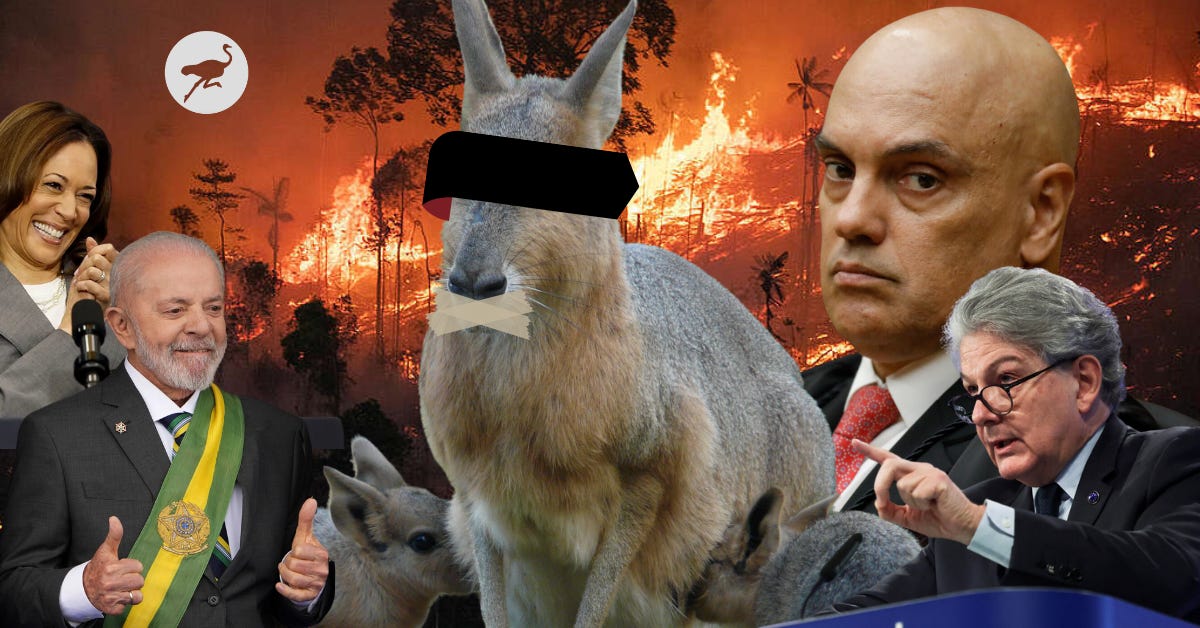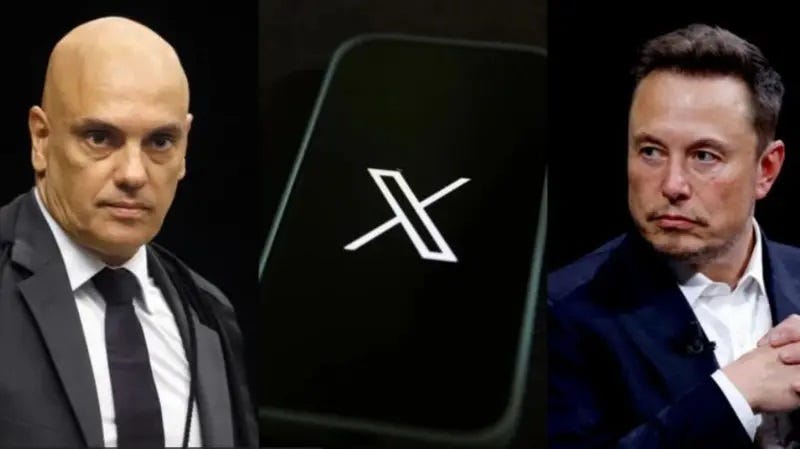Modern Memory Holes
When governments lose control of the narrative, free speech is the real fugitive.
Welcome Avatar! The censoring of 𝕏 in Brazil is the continuation of an ongoing process to erode freedom of speech online, and this is accelerating in emerging economies and the “developed world” alike. Is there a way to fight back, and how? Let’s dig in.
Governments seem to be increasingly “worried” about online freedom of speech being just a little too free for their liking.
The latest example of this could be seen in Brazil, where Supreme Court judge Alexandre de Moraes decided to ban 𝕏 from Brazilian ISPs because Elon Musk wouldn’t bow to his demands of establishing legal representation for 𝕏 in Brazil.
Before this demand, when 𝕏 was still called Twitter, judge Voldemort had demanded that certain accounts that were questioning the 2022 election results (among which many Argentine accounts) be made unavailable in Brazil.
The woke Twitter team under the leadership of former CEO Parag Agrawal happily complied.
Once Musk took over little later, he gradually made these accounts available again in Brazil, some only recently. This triggered the feud between 𝕏 and De Moraes, who demanded the accounts be made unavailable again because he didn’t like them and they were “a danger to democracy”.
Just how little Lula’s friends like Voldemort de Moraes care about democratic procedures was clear soon after, where he decided to go after Starlink’s bank accounts, which is a completely separate entity from 𝕏, lol.
Even the likes of Washington Post, usually not a fan of anything to do with Elon Musk, stated that the authoritarian judge went a bit too far:
“Mr. Moraes’s takedown campaign might have been effective in combating right-wing conspiracy theories, but at a substantial cost to free expression — with mandates for removals and even arrest warrants often issued under seal and with scant reasoning to support them.
The recent move against 𝕏 is both more of the same and just plain more: After 𝕏 ignored the court’s orders to block more than 140 accounts, the justice warned he would arrest its legal representative in Brazil.
That prompted Mr. Musk to remove 𝕏’s team from the country. That lack of a physical presence, in turn, led Mr. Moraes to instruct that 𝕏 be blocked for all 220 million Brazilians — who, he said, could face fines of almost $9,000 a day if they tried to circumvent the restriction.”
The legal representation in Brazil angle was the excuse sought by Moraes to censor 𝕏, because the real reason for censoring 𝕏 is that people in his position of power do not like freedom of speech too much if that speech goes against the official narrative.
Now, after censoring 𝕏, Brazil is joining a list of countries that you shouldn’t want to be on if you wish to attract more foreign investment:
Elon's first response was Brazilian Starlink users wouldn’t have to pay for the service, since Starlink couldn’t receive payments in Brazil anymore. Subsequently those users would still be able to access 𝕏 through their Starlink connection. But he's since backtracked.
Now if you're a Starlink user in Brazil, you can't access 𝕏, which is an interesting example of what kind of pressure governments can place on centralized organizations like 𝕏/Starlink.
A Global Pattern
What does all this have to do with your freedom of online speech, you ask, if you don’t live in Brazil? Everything.
Brazil is not the only country going down this route. Lulaland can just take a shortcut because bold authoritarians like De Moraes have more power to act fast compared to “Western” societies. But the latter are following suit.
In supposedly more democratic pastures such as Europe and the US, things do not look a whole lot better.
The Digital Regulation Overlord Thierry Breton has had many back and forths with Musk, with little difference compared to De Moraes in terms of demands for censoring accounts, content etc, through the KGB-worthy Digital Services Act spun up in Brussels.
In one of his latest open letters to Musk, Breton referenced the Digital Services Act to pressure Elon into censoring Donald Trump on 𝕏.
Other platforms like Meta, YouTube and Google happily comply with most of these demands, making their platforms increasingly hard or impossible to use depending on the information you’re looking for.
In the US, Kamala Harris, during one of the few TV interviews she has dared to agree to for her campaign, said that:
“He [Musk] has lost his privileges. It [𝕏] has to be taken down. You can’t say that you have a different rule for Facebook than you have for Twitter. The same rule has to apply.
There has to be a responsibility placed on these social media sites to understand their power. They are directly speaking to millions and millions of people, without any level of oversight or regulation. And that has to stop.”
Translation: “If these platforms do not police content to conform to government-approved narratives, they will be shut down.”
De Moraes and Lula couldn’t have said it any better, and they can give Kamala a pat on the back for backing them up.
Telegram
On the other side of the pond in the EUSSR, Pavel Durov, CEO of Telegram, was arrested in France on August 24 after being lured to the country for a fictitious lunch with President Macron. As soon as he set foot on the Charles de Gaulle airport, police sent him straight to jail.
French authorities indicted him on six charges, and he was released on €5 million bail and prohibited from leaving the country.

Durov was arrested as part of an investigation into alleged crimes involving child pornography, drug trafficking, and fraudulent activities linked to the Telegram app:
“[…] because the app offers encrypted communication that is impossible to crack, Telegram also attracts criminals and terrorists. And that appears to be why Durov is in trouble.
Paris prosecutor Laure Beccuau has alleged that Durov was complicit “in managing an online platform to enable illegal transactions,” and that in multiple criminal cases, Telegram had shown “near-total absence” of a response to authorities’ requests for cooperation.”
The allegations are almost exactly the same as we’ve seen in Privacy in the Age of Panopticons, with the Tornado Cash case: if you create an app, the EUSSR is holding you responsible for what users do on that app.
It would be the same logic to arrest the Google CEO because a Gmail user sent an email with illegal material in the attachments, or send a SWAT team to Tim Cook’s house because some iPhones were used by a drug cartel, or apprehend the Toyota CEO because a driver decided to ram a Hilux they produced into a crowd.
Knife and gun producers must be shitting bricks by now.
All jokes aside, it should be obvious that the tool is not the culprit. However in the case of software, governments seem to have a hard time understanding that simple principle.
This is by design, since these tools can be molded into vehicles that expand or undermine the power of the State on a much wider and faster scale.
Freedom Technology
Is there a way out?
No matter how much founders want to go against authoritarian censorship, in the end their platforms will be forced into submission through legal frameworks, taxes, fines or simply be blocked for the majority of the population.
The positive side effect of all these crackdowns on centralized software with CEOs and product teams is that people are starting to slowly wake up and think about the liabilities of trusting their freedom of speech with centralized companies like Telegram or 𝕏.
In Brazil, Google searches for VPNs skyrocketed after judge Voldemort forced ISPs to take down Musk’s app. That still does not solve the bigger issue, but it is a first step in the right direction.
When Jack Dorsey stepped down as Twitter CEO in 2019, these centralization issues around social media were some of his main concerns. In a post earlier this year, he voiced the exact problem very succinctly:
But let’s assume that someone’s a large opposition voice in Brazil, like Deputy Marcel van Hattem in Southern Brazil for example, who technically gets around it and then just sends the tweet.
The Brazilian government can still see that he did that and punish him accordingly. They can hit users like Marcel with fines, jail time, go after their family, go after their businesses.
The big concern with 𝕏 is the increasing push to identity verify all users, especially big accounts — even most blue check anon accounts are all verified with a real world identity behind them, and 𝕏 has the power to decide to share that information with authorities or not. A real liability.
Enter Nostr.
Nostr is not an application. It is Freedom Tech that can be used to create apps or make them work in a decentralized way, and Nostr is not managed by a specific entity. Through decentralization, Nostr operates under an open source code, which prevents content censorship and account blocking.
In addition, Nostr allows users to not have to create a profile to use it and, if they do, they will have the possibility of moving their account from one application to another without having to start from scratch through a private key, very similar to a Bitcoin wallet.
On traditional social networks, when sending a message, the platform is an intermediary that keeps the information to get it to the other side. On Nostr, things work differently.
Nostr operates through relays, which is a software that sends, receives and stores text messages. So the user is the one who chooses which relay to send the message or upload the content through, preventing it from being seen on other relays, which can be created infinitely.
These relays can be operated by anyone with a laptop and an internet connection, which opens the doors even further for technology and communication to be on the side of users, without depending on an intermediary who can censor them.
Final Thoughts
When governments lose control of the narrative, free speech is the real fugitive, and no CEO like Musk will be able to save or guarantee it. On all platforms that are centrally controlled like X or Telegram, pressure will be placed where that central control is vulnerable.
Once all centralized platforms abide by the rules set by the Ministries of Truth of the most powerful jurisdictions, it will be impossible to critically discuss official narratives, and past discussions that turned out to be unfavorable for the dominant narrative can be deleted or altered — literally memory holed.
Much like Nietzsche’s sister altering her brother’s manuscripts by changing the text to better fit the nazi narrative she was a big fan of in one of the manuscripts published after his death1, so can the Ministries of Truth alter texts that are deemed “offensive” or just not woke enough according to today’s snowflake standards.
Autist note: you can learn more about Nietzsche’s sister and the all Arian town she founded in Paraguay here:
As a rule of thumb: anything that you did not specifically download —and preferably printed on paper afterwards—, can be altered and will be altered. This is why sections, words and paragraphs in digital copies you buy on Amazon could eventually be memory holed.
This has already happened with passages of Roald Dahl books:
On 19 February 2023, Puffin Books announced that it would be altering the language used in many of Dahl's books to expurgate what they deemed derogatory words and passages. The process took approximately three years, and was conducted in association with Inclusive Minds, a collective that promotes accessibility and inclusivity.
A report from British newspaper The Telegraph found hundreds of removed or altered words and passages.
So, if it you do not own a print copy from before the woke madness, you can’t be sure you are reading what the author intended you to read. Needless to say that digital versions are even easier to memory hole.
The same goes for centralized platforms versus Freedom Tech.
Any centralized platform will eventually have to succumb to State pressure for censorship, since it is virtually impossible for those platforms not to.
Founders can be arrested, bank accounts can be frozen, IPs can be blocked, App Stores can be forced to delete Apps from their stores, and so on.
One of the few lights at the end of the censorship tunnel are decentralized open source protocols like Nostr, and eventually most defenders of free speech will realize this.
Nostr solves the ability to create accounts without permission that are not linked to your identity. As Nostr starts to hit scale, and more and more people use it, people that do not have personal information attached to their Nostr accounts can have larger and larger audiences.
Nostr accounts will be incredibly robust against the type of government censorship we are seeing at the moment.
I am personally using the Primal and Damus apps (but there are many more), where you can also create a lightning address to send and receive satoshis for posts.
Seeing all my posts and my profile after logging into a completely different app with just a private key was a similar eye-opener to the first time I ever used a private key for a Bitcoin wallet on a different app, and the same balance appeared.
Just beautiful and extremely powerful.
See you in the Jungle, anon!
Other ways to get in touch:
X/Twitter: definitely most active here, you can also find me on Instagram but I hardly use that account.
Nostr: increasing my posts here, my npub: npub1sngpxenyrddqvnusf02fls8yl0ja3s373md9lmfkej2l0h6saz6qvglthh
1x1 Consultations: book a 1x1 consultation for more information about obtaining residency, citizenship or investing in Argentina here.
Podcasts: You can find previous appearances on podcasts etc here.
WiFi Agency: My other (paid) blog on how to start a digital agency from A to Z.
Elisabeth Forster-Nietzsche edited the early editions of the Will to Power, which is a text she constructed out of his notes, but contemporary editions have removed her influence. The best thing is to read very recent editions of this work if you’re interested, since many of the editions published before the 1970s contain the contaminated version — Source











I’m on Nostr too ! npub1s82rmg0q0wrxxylv0cw99uuuq5hd557e7d63sn57sfzdu4drrl0q9mazfe
I think though that at some point Elon Musk could choose to fight some nation-states, and even create a Network State https://disruptive-horizons.com/p/elon-musk-vs-the-nation-states